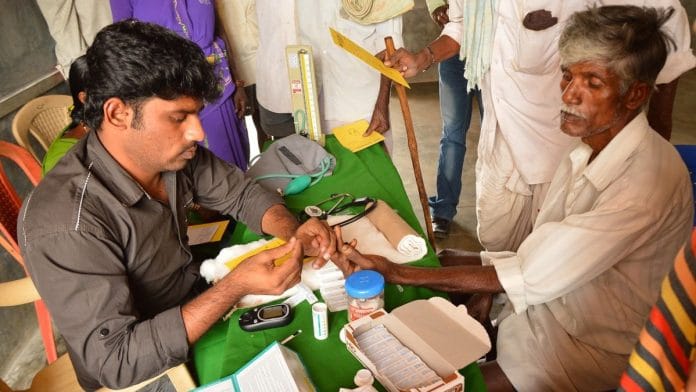New Delhi: There is excitement and hope in the insulin market the world over after U.S. based pharma giant Eli Lilly & Company on Monday announced results of its “successful” late-stage trial of its weekly insulin.
This is only the second such therapy for diabetics after the 2024 launch of weekly insulin Icodec, available under the brand name Awiqli by Danish drugmaker Novo Nordisk in some countries.
Icodec received regulatory approval in India last year and the highly anticipated drug is set to be launched in the country soon.
As they dramatically simplify treatment for many patients by reducing the frequency of injections from daily or mealtime to weekly, weekly insulin shots are being seen as potential gamechangers for millions of diabetics who need insulin therapy.
Eli Lilly said that its QWINT-1, QWINT-3 and QWINT-4 Phase 3 clinical trials evaluated Efsitora in adults with type 2 diabetes who used insulin for the first time, previously used daily basal insulin (insulin that acts for longer period), and mealtime insulin, respectively.
The results from the trials have been published in The Lancet and the New England Journal of Medicine Sunday.
In each trial, once-weekly Efsitora met the primary endpoint of effective glycemic control measures as A1C reduction—a marker of glucose control in the blood—compared to daily basal insulin and demonstrated safety.
The pharma company now plans to submit the once-weekly insulin for adults with type 2 diabetes to global regulatory agencies by the end of this year.
“The novel fixed-dose regimen used in QWINT-1 for once-weekly Efsitora, which consisted of only four single-dose titration options, has the potential to facilitate and simplify insulin therapy, reducing the hesitation often associated with starting insulin to treat type 2 diabetes,” said Dr Julio Rosenstock, senior scientific adviser for Velocity Clinical Research at Medical City Dallas, clinical professor of medicine, University of Texas who led the clinical trial.
Potential paradigm shift
Independent experts too underline that weekly insulin, once available, is going to be a helpful advancement as it has the potential to improve treatment adherence, as many patients struggle with taking injections every day.
“Reducing the injection frequency makes treatment more convenient and less burdensome,” pointed out Dr Manisha Arora, Director, internal medicine at the CK Birla Hospital, Delhi.
Currently, insulin Icodec is available in the European Union, Canada, Japan, Australia, and China.
In response to a query by ThePrint, Novo Nordisk said that while the firm does not yet have a confirmed date for the launch of its once-weekly basal insulin, it is working towards making it available at the earliest.
“We continue to be committed towards driving change to defeat serious chronic diseases and continue our commitment towards innovation for the benefit of patients, globally,” the company also added.
Insulin therapy is a must for nearly all patients with type 1 diabetes and for approximately 10 percent of those with type 2 diabetes or diabetes mellitus.
Type 1 diabetes, according to experts, is characterised by complete loss of the insulin-producing beta cells due to an autoimmune disease or idiopathic or unknown reasons.
Type 2 diabetes, on the other hand, is mainly triggered by insulin resistance or the body’s inability to respond to insulin, often combined with relatively reduced insulin secretion and is linked with lifestyle issues such as poor dietary habits and lack of physical activity.
The World Health Organisation (WHO) estimates that globally 9 million people with type 1 diabetes need insulin therapy while of the nearly 60 million people with type 2 diabetes, only half have access to insulin.
A 2023 survey by the Indian Council of Medical Research (ICMR) and Madras Diabetes Research Foundation had estimated that nearly 101 million people in India had diabetes.
This survey also indicated that while most people with diabetes have type 2, the number of those with type 1 was estimated to be around 9 lakh, and this includes a large number of those under 18 years of age.
How weekly insulin works
Experts underline that effectiveness of a medication such as insulin essentially depends on what’s known as its half-life, the time it takes for its concentration to be reduced by half in the bloodstream. A longer half-life means the substance stays active in the body for a longer period. To develop a weekly insulin, the half-life of insulin is increased using various scientific techniques.
One method is molecular modification, where the insulin molecule is altered to reduce its clearance rate and prolong its action while another approach is insulin buffering, which involves binding the insulin to another molecule that slows its release into the bloodstream.
Additionally, insulin crystals can be created that dissolve slowly, enabling a gradual release of insulin over time. “These modifications allow the insulin to remain active in the body for a full week. Imagine the convenience for patients who currently require daily injections; switching to a once-a-week insulin shot could feel like a blessing,” Dr Manisha Arora underlined.
Many patients, she said, depend on family members for insulin administration, for example those with poor eyesight, literacy challenges, or limited dexterity.
“A once-weekly dose makes it easier for both patients and caregivers,” the clinician pointed out and added that weekly insulin can also provide more sustained glucose control, improving overall health outcomes.
“By reducing the number of injections, we also enhance the quality of life for patients, easing both physical and emotional stress. The doctors too will be far happier prescribing once-a-week insulin therapy,” said a diabetologist with Safdarjung Hospital in Delhi who did not wish to be named.
Clinicians sometimes have to work hard at persuading patients—especially those with severe diabetes mellitus—to switch to insulin therapy, he said. “With a more patient-friendly option, initiating and maintaining optimal treatment adherence is convenient, especially in Type 2 diabetes, where insulin may be required over time,” said the Safdarjung diabetologist.
(Edited by Viny Mishra)
Also read: New subtype of diabetes found in India could change how rare forms of disease are treated






